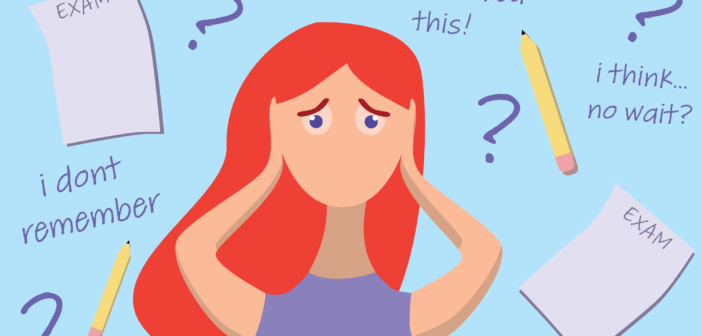It’s normal to feel a bit of anxiety about performing well on an exam because it can boost your performance. However, when anxiety levels interfere with test performance, students may wish to address the issue.
Test anxiety is “having worry or concern about failing a test,” said Zellessia Ejalonibu, a counselor at Dyson Wellness Center. More specifically, it’s “having anxiety when you are about to approach or take an exam, especially an important exam,” like a midterm or a final exam.
The American Test Anxieties Association (AMTAA) reported about 16 to 20% of students have high test anxiety. Additionally, 18% of students have moderately high test anxiety. Moreover, it affects more than 10 million children in North America. The AMTAA considers test anxiety to be “the most prevalent scholastic impairment of our schools today.”
Test anxiety affects students
According to Oxford Learning, high-achieving and underprepared students typically have trouble with test anxiety. On the one hand, high-achieving students tend to place more pressure on themselves, leading to an overwhelmed feeling during tests. On the other hand, underprepared students usually don’t understand the material, which can lead to low confidence during exams.
However, “from my experience, I feel like anybody can be affected by test anxiety,” said Ejalonibu. Any student can have trouble with test anxiety because many factors play into making people anxious. “It could either be situational, mental, inherited … (a) history of trauma makes you more anxious,” said Ejalonibu. Different testing environments could cause situational test anxiety, while low self-esteem or negative self-talk could cause mental test anxiety.
Below are some common signs of test anxiety that Ejalonibu shared.
- Worrying about forgetting material while studying
- Freezing or going blank during tests
- Having irrational negative thoughts before a test
- Feeling like you have never done enough to prepare
- A feeling of doom or fear of failure during tests
- Not being able to sleep the night before every test
- Lack of confidence
- Difficulty concentrating while studying for upcoming tests
- Performing well in class but failing to do well when tested
- Physical symptoms before a test (stomach rumble or vomit)
The most common signs Ejalonibu sees are “negative thoughts and not being able to focus during a test because (students) are anxious.” For students who have trouble with test anxiety, Ejalonibu shares tips on how to overcome it.
- Prepare for the test ahead of time
- Engage in positive self-talk before and during tests
- Eat well before tests
- Get rest before tests
- Exercise before tests
- Try relaxation techniques during exams (breathing in and out)
- Arrive early to avoid adding stress
- Use good test-taking skills (read questions carefully)
- Seek help in school from your instructor or tutor
- Seek help outside your school like seeing a doctor
Resources on campus
In the past, Dyson has done workshops for test anxiety before midterms and final exams, according to Ejalonibu. Currently, there is no event for test anxiety on campus, although students can go to Dyson for one-on-one counseling.
According to the Journal of Physician Assistant Education, under the Americans with Disabilities Act of 1990, test anxiety is not considered a learning disability. However, Ejalonibu encouraged students to talk to their professors if their test anxiety is severe enough for accommodations.
“If you have test anxiety, know that you are not alone; it’s widespread,” said Ejalonibu. “A good majority of college students experience a form of test anxiety. If you are experiencing a state of test anxiety, talk to your professor. (Be) prepared and be confident.”


1 Comment
Good tips! Thanks for the article.